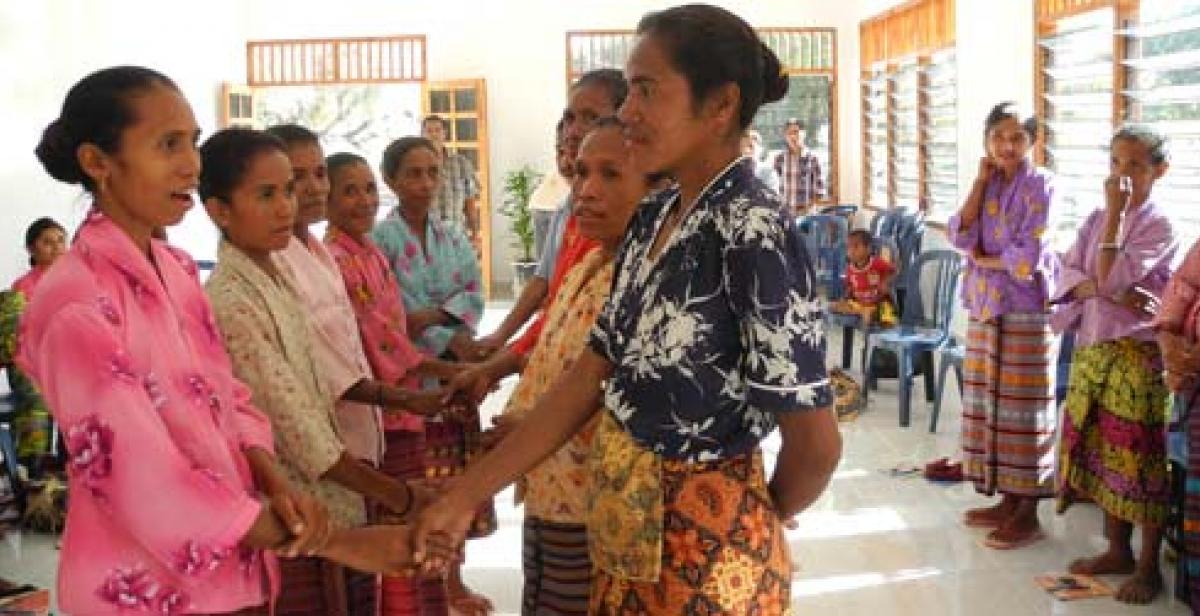Funding Officer Silvia Fabbri reflects on a visit to the women's self-help groups Progressio is working with in Oe-cusse, Timor-Leste.
Working in the international development sector can be one of the most frustrating jobs. Sometimes, you have to sit down and wonder whether what you do is really making any difference to people’s lives or is it just a way to give meaning to your own life?
Last week I travelled to Oe-cusse, one of the poorest districts of Timor-Leste where Progressio works with FEEO (Fundasaun Esperansa Enclave Oe-cusse), a local organisation, who for the past two years have been contributing to the strengthening of their capacities in advocating for the rights of the poorest people of the district. FEEO works with women from the rural areas and over the last few years has contributed to the creation and development of self-help groups. They’ve been able to do this, partly through the support provided by Tobias Lugoloobi, Progressio’s Development Worker.
With FEEO, I visited some rural villages travelling by car along dried up riverbeds and rocky roads, which the government does not care to repair. We met with the women from the self-help groups who explained to us the economic and social challenges they face because of being poor and being women.
Travelling to Oe-cusse really brought home to me just how cut off and marginalised women in the self-help groups Progressio is working with there are. The Oe-cusse district of Timor-Leste is a coastal enclave separated from the rest of Timor-Leste and to get there I had to travel for 12 hours by ferry. Boarding the ferry at low-tide was an adventure in itself…

Most of the villages in the rural areas of Oe-cusse have not been reached by electricity yet, or by clean water, nor hygiene and sanitation services. Others have been provided with water through wells built with the aid of international agencies. Sadly, these wells, despite being built just a few years ago, seem to be disused or at the very least not properly maintained. Some of these villages do not have schools and most of the adult population have never learnt to read or write.
Life is unmistakably hard for these women and domestic violence is not uncommon. One woman told me: "I work all day in the fields to grow products to be sold at the local market and sometimes it happens that dinner is not ready when my husband gets back home, so he gets angry and beats me." It is when you hear all this that you start wondering, are we, as international organisations, making or will we ever make any difference?
But when one women sat beside me and told me how the creation of the self-help group has improved her life and that of her family, my hope was renewed. She told me: "If an emergency happens and I need money, now I do not have to sell my chickens at a lower price but can ask for a loan from the group." The group helps her save money and have access to credit at a low interest rate. "Since I have joined the group I have been able to take part in cultural ceremonies."

The women I met were not asking for a well, for a school, for money. They asked for continued support for the group so that they could improve their marketing skills and advocate for the provision of the transport they need to reach markets where they can sell their products. They are asking to be empowered to make the difference in their own lives.
Visiting FEEO has made me realise that we can make a difference, but that true development can only ever be ‘people-powered’ and seeing women changing things for themselves has renewed my hope and belief in what I do.

Photos:
1. Women taking part in economic empowerment workshops carried out by Progressio development worker Vilma Horca.
2. Boarding the ferry at Oe-cusse at low tide.
3. Women involved in the self help group in Malelat Village in the mountainous region of Oe-cusse, Timor-Leste.
4. Silvia says farewell to women at the self-help group in Oe-cusse, Timor-Leste.



